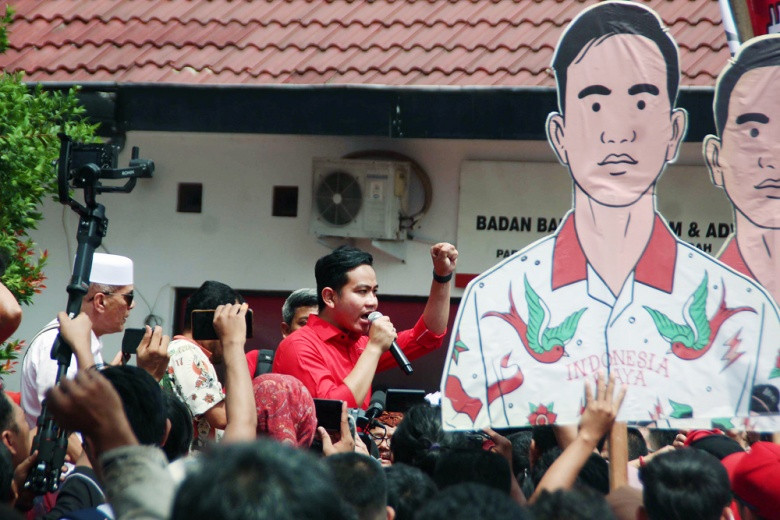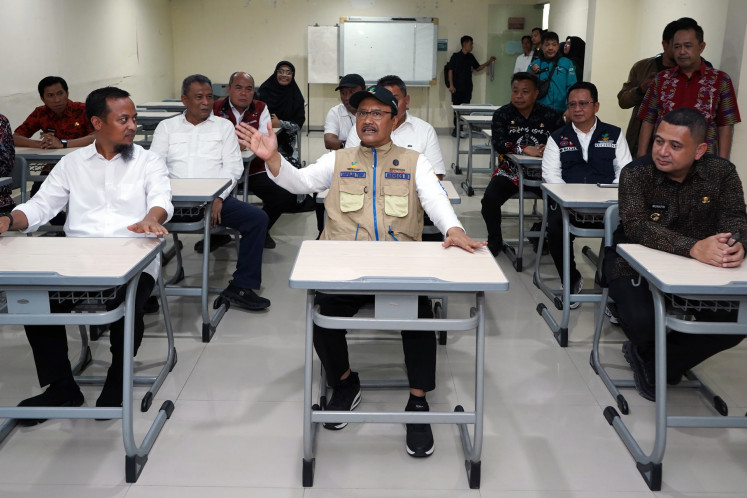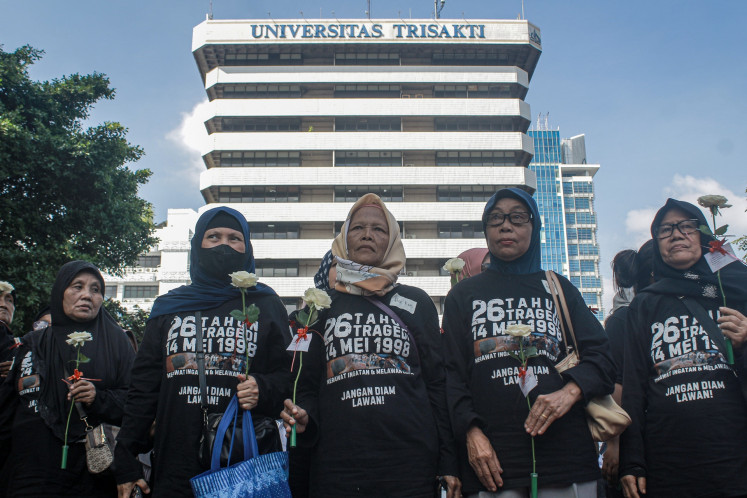Jokowi political dynasty gestates
Provisional counts show two relatives of the President in the lead in their respective regional elections.
Change text size
Gift Premium Articles
to Anyone

P
resident Joko “Jokowi” Widodo could be the first Indonesian leader to have two “sons” as mayors, as the 2020 simultaneous regional elections look likely to pave the way for a nascent political clan.
Two pollsters, Charta Politica and VoxPol Center, found on Thursday that Jokowi’s eldest son Gibran Rakabuming Raka and his running mate Teguh Prakosa were leading the race for mayor and deputy mayor of Surakarta, Central Java, with over 86 percent of the sampled votes.
The provisional results were similar to those of the General Elections Commission’s (KPU) real-time vote database, Sirekap, which had compiled 54 percent of the votes in the city, suggesting that Gibran was likely to beat his opponent Bagyo Wahono in the contest.
Gibran is backed by a broad coalition of parties, including the Indonesian Democratic Party of Struggle (PDI-P), which catapulted his father to the presidency. Bagyo, on the other hand, ran on an independent ticket.
Hundreds of kilometers to the west, Jokowi’s son-in-law Bobby Nasution is looking to win the Medan mayoral race in North Sumatra.
Provisional counts by Charta Politika, Voxpol Center and the Poltracking Institute have shown that Bobby and his running mate Aulia Rahman have gained over 52 percent of the sampled votes. The results are similar to the KPU’s Sirekap, which had compiled 35 percent of Medan’s votes as of Thursday afternoon.
In response to the quick count, Gibran said he was more focused on health and safety than on winning the election, while Bobby said he preferred to wait for the official results from the KPU.
“This is still the result of a quick count survey, so we had better wait for the official results,” Bobby said at a press conference in Medan on Wednesday.
Gibran and Bobby’s candidacies have drawn outsize attention, with critics accusing Jokowi of attempting to establish his own political dynasty. Jokowi won the Surakarta mayorship in 2002 and the governorship of Jakarta in 2012, which cleared his path to the presidency.
In Indonesia, political dynasties are typically nurtured by nepotism. Those who wield power and influence hand out high-ranking government positions or pass the torch of leadership to relatives or acquaintances.
For years, political experts have noted this phenomenon as a flaw in Indonesia’s democracy because it paves the way for oligarchy.
The public has also grown weary of such family affairs.
A July survey conducted by the research and development department of Kompas found that about 61 percent of respondents did not like the idea of family members of political leaders running for regional head posts. However, 28 percent still perceived such practices as normal.
Gibran brushed off accusations of dynastic tendencies, saying that people were entitled to their opinions and that he could still have lost despite his familial ties to the President.
“If you’re asking about a political dynasty, which dynasty do you mean?” Gibran asked. “Just like any other contender in the race, I can win or lose. [Voters have] no obligation to choose me. It just so happens that I am the son of the President.”
In addition to Gibran and Bobby, some other politically connected figures have tried their luck in this year’s elections. However, not all of them have had the same success.
Defense Minister Prabowo Subianto’s niece, Rahayu Saraswati Djojohadikusumo, and Vice President Ma'ruf Amin’s daughter, Siti Nur Azizah, are expected to lose in the South Tangerang mayoral elections in Banten, based on results from numerous quick counts.
Rahayu ran for deputy mayor, and Siti led a separate ticket as a mayoral candidate.
Both seem to have been bested by incumbent deputy mayor Benyamin Davnie, who paired up with Pilar Saga Ichsan – the nephew of former Banten governor Ratu Atut Chosiyah.
Three pollsters – Indikator Politik Indonesia, Charta Politika and Lingkaran Survei Indonesia (LSI) – said the pair had won over 40 percent of the sampled votes, in what looks to be a secure win for the political clan that has led the region for more than a decade.
Voters tend to consider family relationships when choosing candidates, including in Gibran and Bobby’s contests, said Kunto Adi Wibowo, executive director of the Indonesian Public Opinion Research and Discussion Group (KedaiKOPI).
The political situation in their regions, he said, had contributed to their expected victories as well. Medan and Surakarta are strongholds of the ruling PDI-P.
“Yes, their popularity might have secured them the election wins. But I also think that their victory could be attributed to the fact that the PDI-P has a large support base in both cities,” Kunto said on Thursday.
“When a party has that many supporters, it can easily mobilize them to vote for any candidate, regardless of their political ties,” he added.
— Ganug Nugroho Adi and Apriadi Gunawan contributed to this story from Surakarta and Medan, respectively.









